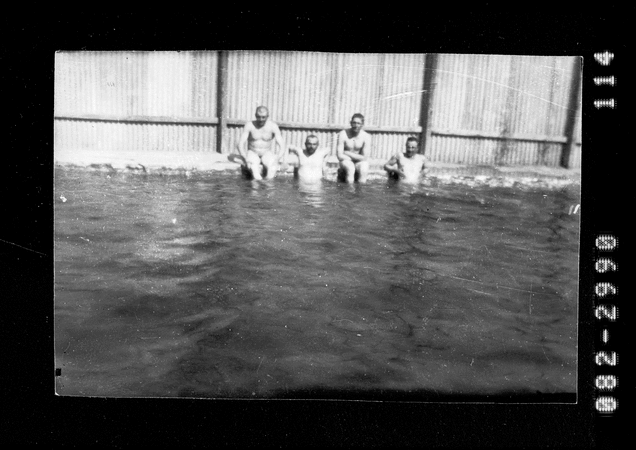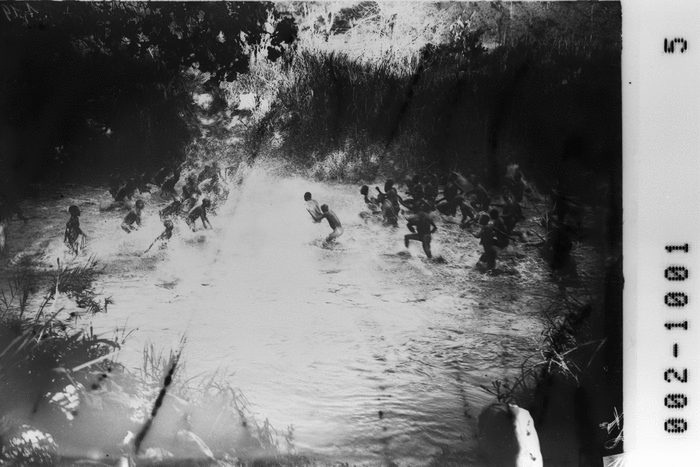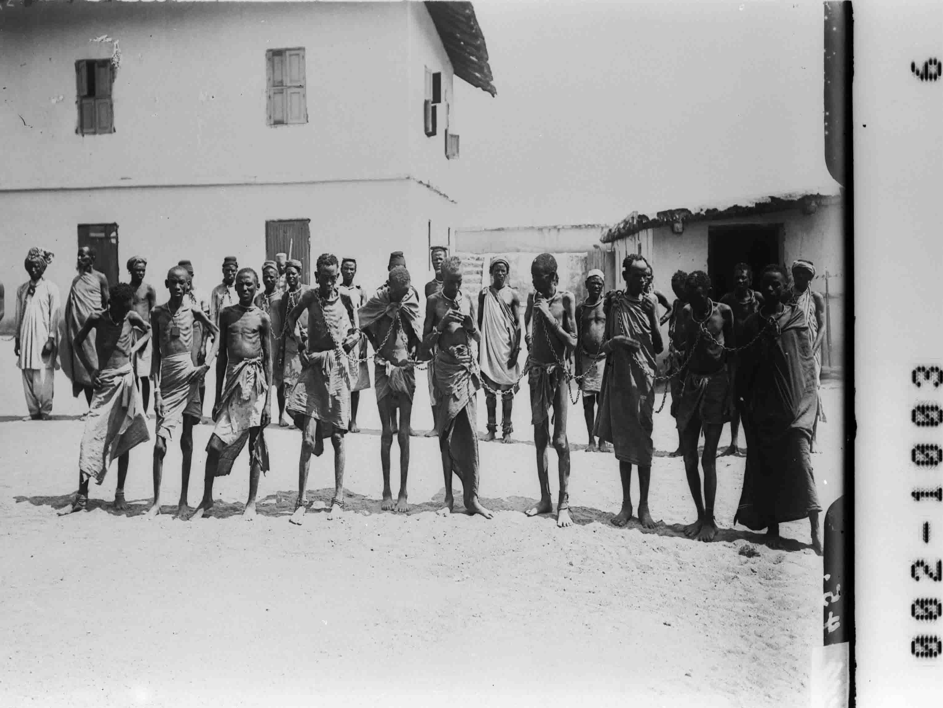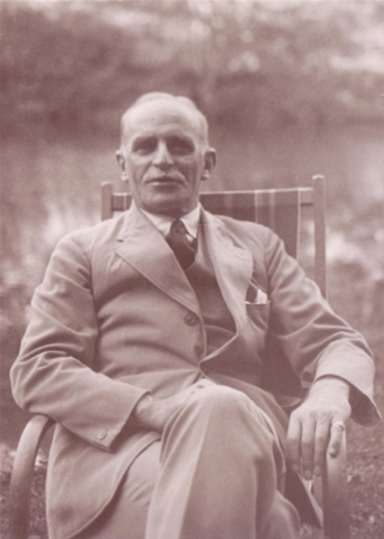Naturism, the Permanent Mandates Commission, and the denial of the violent nature of colonialism
Florian Wagner (Assistant Professor - Universität Erfurt)
After the First World War, Belgium designated one of its most outstanding colonial experts, Pierre Orts, as a member of the new League of Nations’ Permanent Mandate Commission (PMC), which administered colonial territories conquered by the allies during the war. Taking up this position in 1921, Orts made it clear that he would also use the PMC to ward off German claims to have their colonial empire restituted:
She [Germany] is incapable of colonization and has shown herself unworthy of fulfilling her civilizing mission. Concerning this matter, a formidable dossier of accusations has been put together. We can add a few pieces to that dossier ourselves, especially a photography [sic] that our colonial officers found in German East Africa, on which one can see a considerable number of German colonists in a state of complete nudity.[1]

Germans Taking a Bath in Windhuk (this is not the potograph Orts mentioned, but a similar one taken in German South-West Africa)
Sammlung Jean Bantz: Windhuk D.S.W.Afr 1904.
Pierre Orts’ proof of German immorality was as amusing as it was cynical. He considered nudity a deplorable sign of a specific German colonial barbarism that brought Germans near to the “natives”. In evoking nudism to question Germany’s civilising ability, he obscured the fact that Africans had suffered from German colonisation as much as they had under Belgian, British and French rule. More importantly, by scandalising nudity, Orts relativised the structural violence that shaped German rule in East Africa, which had manifested itself in arbitrary justice, compulsory expropriation, forced labour, corporal punishment, racial discrimination and the devastating war against the population labelled ‘Maji-Maji’, which caused a famine and the deaths of 100,000 East Africans.[2]
To make sense of Orts’ perverted moralising, I will argue in this essay that it stood for a more general tendency in the PMC to address colonial scandals, without challenging the colonial system as such. Although making isolated colonial scandals public (such as the nudity of the Europeans), the PMC and its members concealed structural colonial violence instead of revealing it.
This argument is in line with Susan Pedersen’s eminent study that unveils the generic colonial character of the PMC. It also follows her reading of the PMC, claiming that it introduced a public culture of “international talk” about colonial scandals. However, it disagrees with her argument that publicising scandals gave colonialism a bad name.[3] On the contrary, by singling out isolated affairs and shaming them on an international scale, the PMC purported the idea that colonialism could be “reformable” and “liberal” – without shaking its foundations at all.[4]
The nudity scandal is perhaps a particularly absurd case. Yet it captures the underlying belief of PMC members like Orts in a racist world order, and the civilisational deficits of the colonised peoples. By repeating such ideas and spreading them as an ‘officialized’ basis of an internationalist and allegedly liberal colonialism, the PMC perpetuated and reinvigorated them. Orts represents this marriage of racism and the PMC’s policy: he was its longest-standing member and attended all its meetings from 1921 to 1939.
The PMC: A civilising institution
It is well known that the PMC emerged from Article 22 of the Covenant of the League of Nations, and was meant to assume the tutelage of the peoples “not yet able to stand by themselves”. It was charged with watching over their “well-being and development” as a “sacred trust of civilization”. In practice, it internationalised the former territories of the Ottoman Empire and the German colonial empire and “entrusted” them “to advanced nations”, who were mostly colonising powers. Their task was to develop the territories and to “civilize” its inhabitants. If those inhabitants saw their own well-being at risk, they could send petitions to the PMC in Geneva, who in turn could theoretically urge the mandatory power concerned to alter its policy.[5] This procedure did not give the inhabitants of the mandates a right to petitioning in the legal sense, nor was the PMC a court whose verdict was legally binding. As Susan Pedersen has argued, the petitions were not legal documents and it was up to the mandatory power to change the law of the colony according to the PMC’s recommendations. Consequently, the PMC rarely took action to improve the lot of the colonised. It did have the merit, however, of making their concerns public.[6]

Colonial photography: Inventing the Wild Native (Kurt von Schleinitz):
Ae I a 134 / Badende Träger / v. Schl. 1,19 [J. & Oe. - - durchgestrichen] DOA, 1907/1914
Orts personified much of what made the PMC, with regard both to its ideology and to its actual policy. On the one hand, he represented a small nation that was a big empire overseas and wanted to use the PMC to assert itself and its interests. On the other hand, he was a convinced internationalist who believed in the solidarity of the civilised Christian nations (excluding Germany after the First World War), which he opposed to the non-Europeans who were backward and had to be civilised. Thus, he was a devoted PMC member who did not hold back from criticising his own country if it ignored the PMC’s guidelines. Orts will be our protagonist, insofar as he illustrates the PMC’s policy in the interwar period.[7]
Using the early League to influence the "international talk" to Belgium's advantage
What was the purpose of Orts’ initiative to add nudity to the “formidable dossier of accusations” against the Germans? The “dossier” referred to a blue book the British government had published after the First World War to prove that the Germans were unable to fulfil the civilising mission and argue that their colonies should be redistributed among the other colonial powers. At first glance, it seems likely that Orts, who represented Belgium and its colonial interests at the Peace Conference of 1919, wanted to secure a portion of the German colonies for Belgium. In the course of the war, Belgian colonial troops from the Congo had conquered parts of German East Africa, specifically Ruanda-Urundi and the fertile region around Tabora. However, the archives tell a different story. Instead of claiming these Eastern African territories at the Peace Conference, the Belgian negotiator asked for territory in Western Congo to secure the estuary of the Congo River.[8] For a long time the Belgians insisted on extending their territory in the West, at the expense of Portugal. Only after the diplomats at the Peace Conference refused to concede Portuguese territory did the Belgian government agree to administer Ruanda-Urundi as a League mandate. Orts and the British envoy Lord Milner sealed this deal in the Orts-Milner accords in 1919.[9]
What other reasons could Orts have had for creating a scandal of German immorality, apart from in revenge for German aggression against Belgium in Europe during the war? He may well have been attempting to distract attention from Belgium’s own very violent colonial history: ever since the mass killings in the Congo under Leopold II in the early twentieth century, the more potent colonial powers had questioned Belgium’s ability to govern and civilise such a vast territory as the Congo. At the Peace Conference, Milner seemed to raise the same issue claiming that Belgian troops in Africa had not contributed much to the defeat of the Germans.[10]
That was hardly true, but Orts was cautious not to go into details about the conquest of German East Africa. The Belgian colonial army had plundered local resources to supply their troops and consequently caused a famine among East Africans. Belgian officers had officially allowed their troops to kidnap local women and to rape them. The ferocity of Congolese troops long haunted the memory of East Africans.[11] Regardless of this cruelty, Orts was successful in portraying Belgium as a victim of German aggression during the war, not only in Europe, but also in the Congo.[12] Consequently, the League of Nations entrusted the Belgian state with the mandate over Ruanda-Urundi.
Becoming a member of the PMC finally enabled Belgium to put pressure on the big powers. Theoretically, Orts could even penalise the British and the French if they did not govern their mandates according to the rules. He did not do that, to avoid retaliation. The PMC established a new balance of mutual whitewashing.

Prisoners in German East Africa: Kettengefangene in Kilimatinde 1907/1914,
DOA - Tansania - Kilimatinde (Kurt von Schleinitz)
Colonial internationalism and the "neutrality" of the PMC
Solidarity among colonisers had many origins and was nothing new. Before the First World War, Europeans competed for colonies but avoided military conflicts through diplomatic congresses, be it during the partition of Sub-Saharan Africa (1884/5) or of Morocco (1911). Diplomats continued to uphold this system of checks and balances while the era of conquest gave way to the period of colonial development. Faced with issues of practical administration after their conquests, colonial officers developed a strong sense for competitive emulation, as they tried to emulate strategies of ruling and exploitation from the more profitable colonies.
Taking up the idea of mutual learning, administrators established the International Colonial Institute (ICI) at Brussels in 1893. It brought together international colonial experts at annual meetings to exchange strategies of efficient administration and develop a colonial science. Its members, who came from twelve colonising countries, styled themselves as “neutral” experts who also took indigenous interests into account. However, the ultimate goal of the ICI was to legitimise colonialism by minimising its excesses, and it did so way into the interwar period.[14] For example, the ICI officially endorsed forced labour in the colonies, at the very moment when the International Labour Organisation (ILO) wanted to ban it worldwide in 1928.14 The PMC built on these pre-existing networks and recruited its own members among those of the ICI.[15] Two thirds of all PMC members were also ICI members, among them Orts and the famous spiritus rector of British colonialism, Lord Lugard. They brought with them the idea that imperialism was more than an expression of nationalism. They shared the purpose of giving colonialism a good name. Against this background, Orts’ concern about Germans “going native” in the colony was also a real concern about the reputation of colonialism as such. What is more, Orts had also been part of internationalist Catholic networks, which might explain why he considered the naked Germans a sort of original sin that might pose a threat to the (Christian) civilising mission. In this regard, he was very much in line with the social Catholicism that influenced the colonial policies of the 1930s.[16] Obviously, the PMC had also declared the civilising mission its main purpose and the members took it seriously.
There was no doubt about Orts’ loyalty to colonial internationalism. Like him, most PMC members saw themselves as neutral experts who did not represent the interests of their countries of origin. Belief in internationalism went as far as readmitting German delegates to the PMC in 1926. While Orts despised them as a Belgian citizen, he accepted working with them in the PMC. In retrospect, his reproach of immoral nudity turned out to be a compliment rather than a critique, given that it relativised the violent rule of the Germans. Other colonial internationalists also quickly glossed over German atrocities. British officials who had used the blue book to delegitimise the German colonial empire during the war stopped printing it and withdrew it from sale in the 1920s.[17]
"Neutrality" as solidarity among colonisers
Such “neutrality” meant that the members of the PMC did not blame each other for the violence inherent to colonialism as such. As Susan Pedersen has shown, the PMC ignored most petitions coming from the inhabitants of the mandates, especially under Pierre Orts’ chairmanship (1936-1940). Even in its early days, Orts defended the PMC against progressive ideas. In 1923, he went as far as betraying the League’s guiding principles. Although its mission was to support the native population in the mandates, he turned down a proposal to force South Africa to value natives over white settlers in its South West African mandate. The PMC dropped the plan.
On another occasion, Orts bitterly attacked the British Anti-Slavery Society, whose members had rightly accused France of turning all land it deemed vacant in its Cameroonian and Togolese mandates into state property. As late as 1932, he publicly refuted the British Colonial Office’s plan to grant independence to the Iraq mandate, even though this was only nominally. In this case, however, Orts failed to assert himself and Iraq became independent.[18] Colonial Office seemed to be less colonial than the PMC under Orts’ influence; Orts held the view that the peoples of the Levant might look back on an ”ancient civilization” but were nevertheless “not able to govern themselves”.[19] The colonial internationalist Orts, and with him a part of the PMC, seemed to be less progressive than the colonial powers who administered the mandates.
Scandals and reform initiatives
As PMC members did not have the right to visit the mandates or to speak personally to its non-European inhabitants, they received their complaints in the form of petitions, via colonial administrators, who annotated them. As we have seen, the petitions were not legal documents and the PMC’s rare recommendations to eschew colonial scandals were not legally binding. The PMC’s reluctance to react to the petitions did not prevent its members from uncovering colonial scandals.
In 1928, when the ILO (International Labour Organisation – an agency under the League) pushed for a ban on forced labour in the colonies, Orts travelled to British East Africa and the Belgian Congo (but avoided mandate territories). Curiously, he found fault only with the Belgian Congo, where Catholic missionaries informed him that the Belgian authorities encouraged forced labour in colonial companies.[20] He inspected an official labour recruitment camp and found 600 men in a desperate state, haunted by fever and without any medical assistance. Half of the prisoners – among them children and old people – were not in a shape to work at all.[21] Once they started working in the copper industries in Katanga, Orts complained, mortality reached up to 144 per every thousand.[22] Orts showed little empathy with the Congolese, but feared that such recruitment practices and the considerable mortality rates would lead to the exhaustion of the Congo’s workforce.
When he approached the Belgian colonial ministry on the matter, he felt he was treated as if he were “a tourist who had superficially visited only a part of the colony and jumped to conclusions too quickly”.[23] Consequently, he published several articles, invoking his expertise as a PMC member and threatening that he would engulf Belgium in a crisis that equalled the campaign against Leopold’s rubber scandals before the First World War.[24]

The colonial gaze: Pierre Orts (1934) (https://fr.wikipedia.org/wiki/Pierre_Orts)
Legitimising colonialism through reform
Orts’ campaign against abuses of Congolese workers certainly risked discrediting the country’s colonial project. Yet he thought of his criticism as a way to save the colonial project from abuses, rather than to bring it down. In his pamphlets, he explained that the entire world admired the Belgians for their colonial achievements and that the great colonial powers had all reformed their colonial policy at some point. Great Britain, for example, had sent three commissions of inquiry to East Africa, India and Palestine in the previous two years to deal with “serious difficulties” in the colonial administrations. These commissions, Orts concluded, “have in no way damaged the British reputation”. On the contrary, they showed its progressive attitude.[25]
Seven years in the PMC had made Orts confident that correcting colonial methods did not threaten colonialism as a whole. Indeed, the PMC had contributed to stabilising, colonialism. It had warded off criticism by claiming that colonial rule could be improved, and was not a problem in itself. After all, Orts’ 1928 campaign coincided with the ILO’s debate about the legitimacy of forced labour in the colonies. The debate on forced labour did not delegitimise colonial rule as such, although mandate powers like France steadfastly refused to ban forced labour both from their mandates and from their colonial territory.[26]
The tone in Europe and in the colonies had changed by that time: as rising violence and scandals seemed to become an integral part of European society in the late 1920s, it became possible to relativise the structural repressive system of colonialism and label its excesses as situational misbehaviour of individual colonisers. The PMC had played its part in normalising violence by merely registering cases of misbehaviour in the colonies without eliminating them. PMC members claimed that they were able to uncover and control abuses through the petitions that the inhabitants of the mandate territories could send to Geneva if they felt a disadvantage or saw their rights violated (though the accused mandatory power could read and annotate the petitions before they reached the PMC). In reality, the PMC widely ignored the petitions and rarely compelled the mandatory powers to change their policy.[27] The consequences of this development became clear when Mussolini’s Italy attacked Ethiopia and the League failed to sanction the brutal conquest. Orts, then the chairman of the PMC, also failed to take a clear stand against Italy’s crimes against humanity.[28]
Conclusion
Orts and the PMC represented both continuity and change in interwar colonialism. Orts stuck to his values, considering nakedness a less civilised act than colonial violence. So did the PMC, which failed to veto colonial crimes and continued to believe in the colonial mission as a legitimate means to bring about progress. Accepting open colonial violence as an integral part of the civilising mission of so-called progressive colonialism seemed to come to an end in 1919, when the allies excluded Germany from the international community for having committed such crimes. However, the condemnation of specifically ‘German’ colonial crimes served the purpose of concealing the violent nature of colonialism as such. With the return of German delegates to the PMC after 1926, the failure to ban forced labour in the late 1920s and the continuation of aggressive colonial wars, open and public colonial violence became widely accepted as a means to induce “progress”. The PMC occasionally criticised colonial violence but never penalised it. Like most Europeans, its members continued to deny the structural violence of colonialism. Pierre Orts took the lead in defending this colonialism.
References
[1] Archives Générales du Royaume Belge (AGRB), Orts Papers, 439 Orts: Souvenirs de ma carrière, ouvrages, annexe, 124.
[2] Becker: Der Maji-Maji-Krieg.
[3] Pedersen: The Guardians, 4.
[4] Ribi Forclaz: Humanitarian Imperialism.
[5] http://avalon.law.yale.edu/20th_century/leagcov.asp#art22 (10.01.2019).
[6] Pedersen: ‘Samoa’, 235.
[7] Susan Pedersen’s comprehensive study addressed the correspondence in Orts’ archive that related directly to the PMC. I will add a few sources, such as material from the League of Nations and ILO archives and especially Orts’ memoirs, to understand his personal background and the origins of his moral and political attitudes. Most of the sources used here are personal documents and reflect Orts’ point of view.
[8] AGRB, Orts Papers, I 184 Carton 389 Orts: Souvenirs de ma carrière, 148-150.
[9] AGRB, Orts Papers 434, Accords Orts Milner 1919, revision de celui-ci 1923: Mémoires Orts: Entrevue avec Lord Milner à l’Hostel Majestic le 20 Mars 1919, 2-4.
[10] AGRB, Orts Papers 434, Accords Orts Milner 1919, revision de celui-ci 1923: Memoires Orts: Entrevue avec Lord Milner. l’Hostel Majestic le 20 Mars 1919, 2-4.
[11] Pesek: Das Ende eines Kolonialreiches, 249-250.
[12] See Horne: German Atrocities.
[13] Wagner: ‘Private Colonialism’.
[14] ILO Archives CAT-6C-13-1: J.Goudal ‘Rapport sur ma mission à Bruxelles (XX session de l’ICI 24-29.06.1929)’, cited in Daele: ‘Industrial States and the Transnational Exchanges’, 209. See also Wagner: ‘Private Colonialism’, 202.
[15] For the close relation between the League of Nations, the PMC and the ICI, see the extensive correspondence in The League of Nations Archives and Wagner: Colonial Internationalism (forthcoming).
[16] Cooper: Decolonization, 291.
[17] Silvester and Gewald (eds): Words Cannot be Found.
[18] Pedersen: The Guardians, 124-5, 139, and 266.
[19] AGRB, Orts Papers, I 184, Carton 389 Orts: Souvenirs de ma carrière, 190.
[20] They also published their accusations in Belgium, see ‘Les abus du recrutement de la main d’oeuvre au Congo. Protestation des chefs religieux catholiques de la Colonie’, La Libre Belgique, 20.01.1929.
[21] ‘Le Congo en 1928’. In AGRB, Orts Papers, Carton 439 Orts: Souvenirs de ma carrière, ouvrages, 13.
[22] ‘Le Congo en 1928’. In AGRB, Orts Papers, Carton 439 Orts: Souvenirs de ma carrière, ouvrages, 13.
[23] ‘Le Congo en 1928’. In AGRB, Orts Papers, Carton 439 Orts: Souvenirs de ma carrière, ouvrages, 13.
[24] For example in Le Flambeau 2 (February 1929) and ‘Le Congo en 1928’. In AGRB, Orts Papers, Carton 439 Orts: Souvenirs de ma carrière, ouvrages, 11.
[25] ‘Le Congo en 1928’. In AGRB, Orts Papers, Carton 439 Orts: Souvenirs de ma carrière, ouvrages, 3.
[26] For an overview, see Maul: ‘The International Labour Organization’.
[27] Pedersen: Guardians, 77-95. 28 Ibid., 292.
[28] Ibid., 292.
Bibliography
Becker, Felicitas and Jigal Beez (eds): Der Maji-Maji-Krieg in Deutsch-Ostafrika 1905-1907, Berlin: Links, 2005.
Cooper, Frederick: Decolonization and African Society. The Labor Question in French and British Africa, Cambridge: Cambridge University Press, 1996.
Daele, Jasmien van: ‘Industrial States and the Transnational Exchanges of Social Policies: Belgium and the ILO in the Interwar Period’. In Sandrine Kott and Joëlle Droux (eds):Globalizing Social Rights: The International Labour Organization and Beyond, ILO Century Series, Houndmills: Palgrave Macmillan, 2013.
Horne, John and Alan Kramer: German Atrocities, 1914. A History of Denial, New Haven: Yale University Press, 2002.
Maul, Daniel Roger: ‘The International Labour Organization and the Struggle against Forced Labour from 1919 to the Present’, Labor History 48 (4), 2007, 477-500.
Pedersen, Susan: The Guardians. The League of Nations and the Crisis of Empire, Oxford: Oxford University Press, 2015.
Pesek, Michael: Das Ende eines Kolonialreiches: Ostafrika im Ersten Weltkrieg, Frankfurt and New York: Campus, 2010.
Ribi Forclaz, Amalia: Humanitarian Imperialism. The politics of anti-slavery activism, 1880-1940, Oxford: Oxford University Press, 2015.
Silvester, Jeremy and Jan-Bart Gewald (eds): Words cannot be found: German colonial rule in Namibia an annotated reprint of the 1918 Blue Book, Boston, MA: Brill, 2003.
Wagner, Florian: Colonial Internationalism. How Cooperation Among Experts Reshaped Colonialism (1880s-1950s), forthcoming 2019.
Wagner, Florian: ‘Private Colonialism and International Co-operation in Europe, 1870-1914’. In Roland Cvetkovski and Volker Barth (eds): Imperial Co-operation and Transfer, 1870-1930: Empires and Encounters, London: Bloomsbury, 2015.
Images
Courtesy of:
- Bildarchiv der Deutschen Kolonialgesellschaft, Universitätsbibliothek Frankfurt am Main.
(1) Bildnummer: 082-2990-114; (2) Bildnummer: 002-1001-05
- United Nations Photo Archive.
